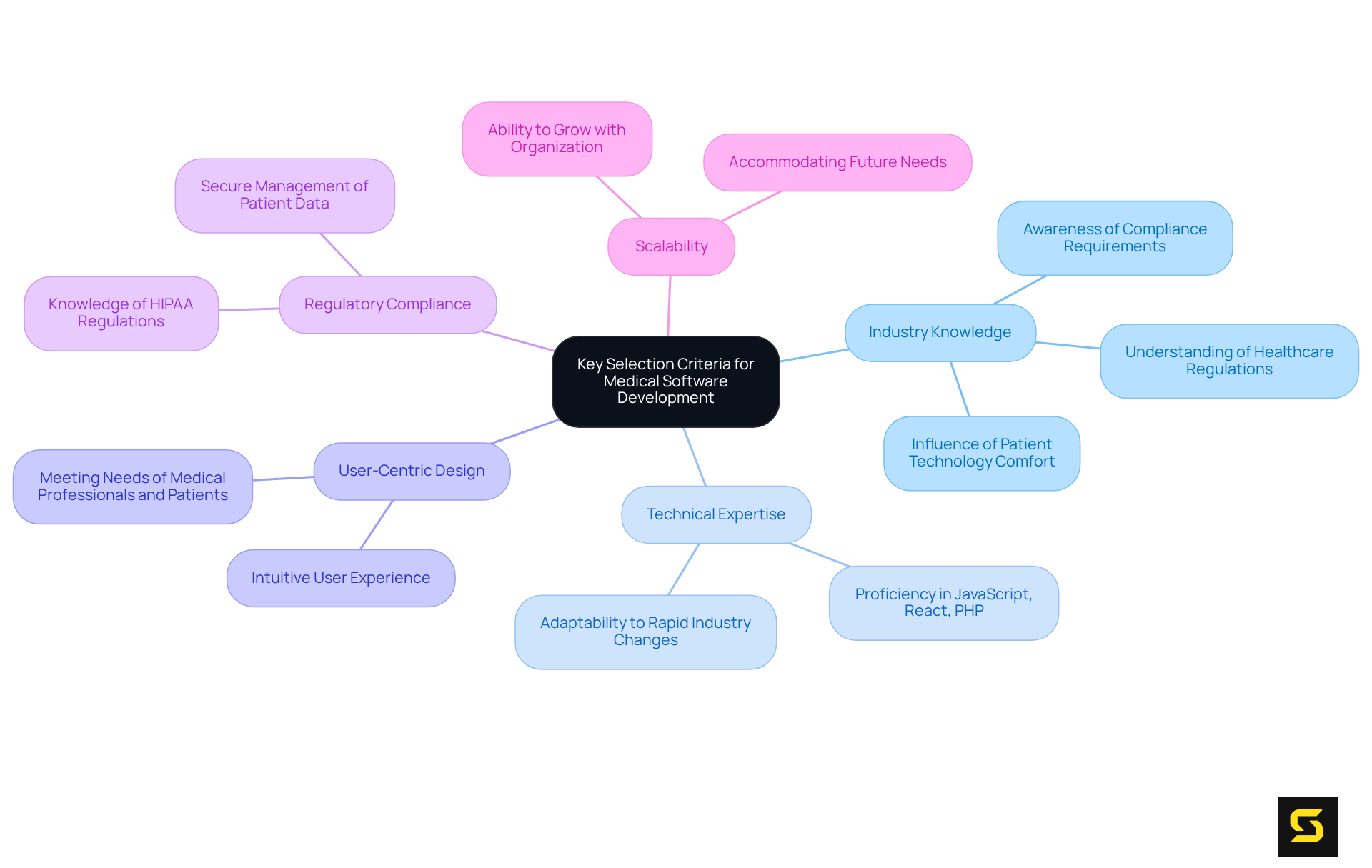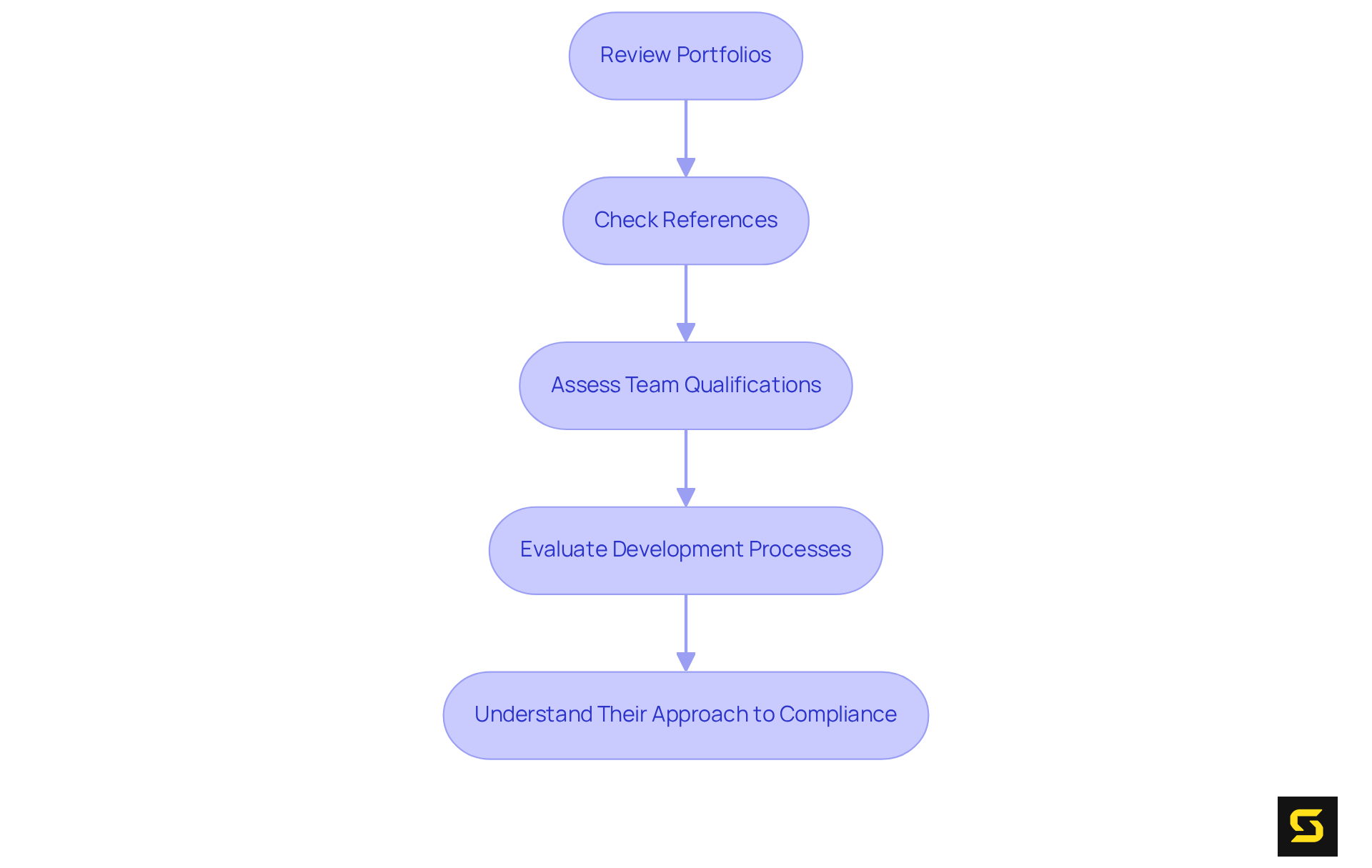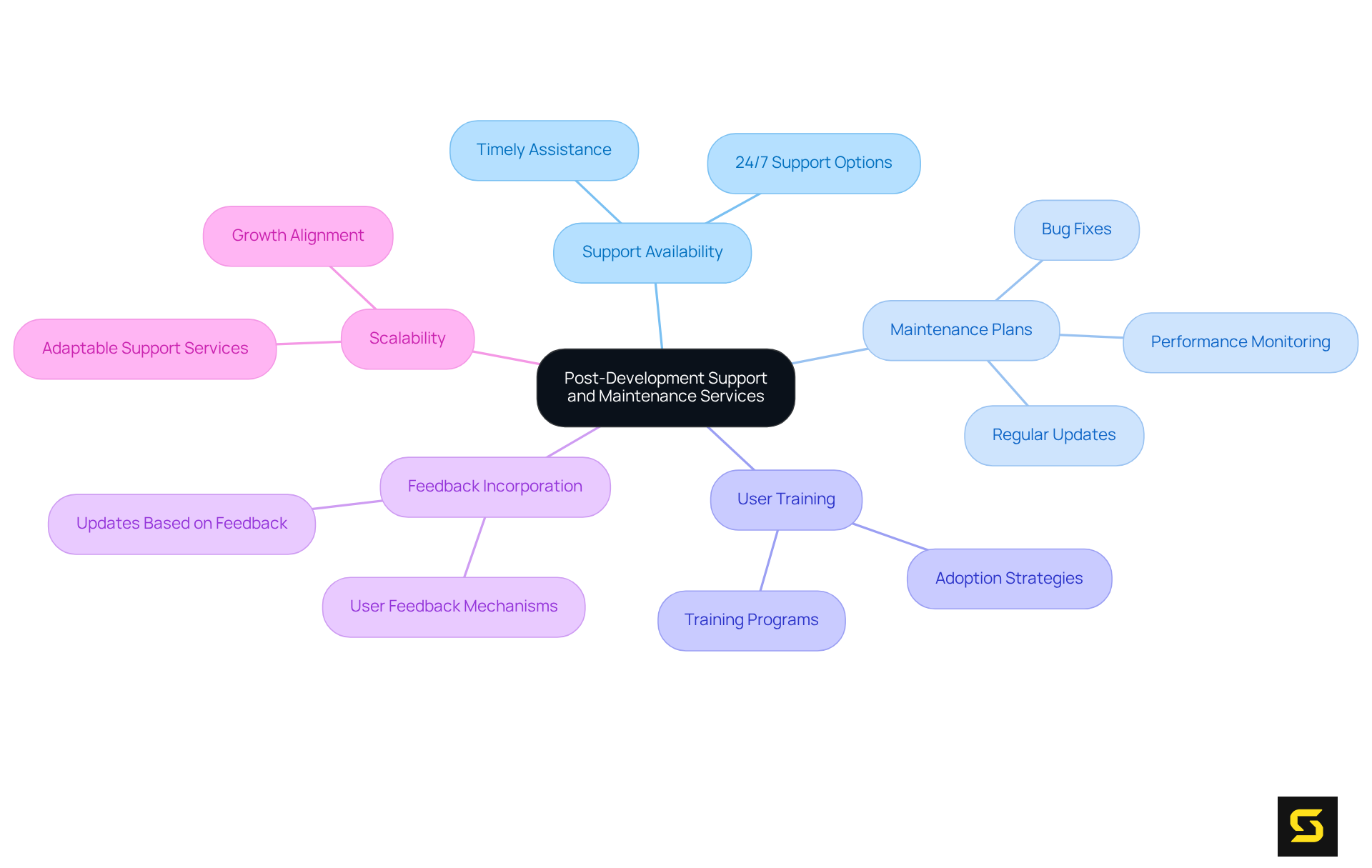Overview
Choosing the right medical software development company is paramount. It requires a rigorous evaluation of essential selection criteria:
- Industry knowledge
- Technical expertise
- User-centric design
- Regulatory compliance
- Scalability
These factors are not just checkboxes; they are critical to ensuring that the selected company meets the demands of the healthcare sector. A thorough assessment of expertise, experience, and post-development support is vital. This comprehensive approach guarantees that the chosen partner can deliver effective and compliant software solutions. Therefore, take action now to ensure your software development aligns with industry standards and healthcare needs.
Introduction
Selecting the right medical software development company is not just important; it is a pivotal decision that can profoundly influence the efficiency and effectiveness of healthcare services. As the healthcare sector undergoes rapid evolution, grasping the essential criteria for selection becomes crucial. This article explores the key factors that organizations must weigh, including:
- Technical expertise
- Industry knowledge
- Post-development support
- Adherence to regulations
Yet, with a plethora of options at hand, how can one ensure that the chosen partner not only fulfills current requirements but also possesses the agility to navigate future challenges in the healthcare landscape?
Identify Key Selection Criteria for Medical Software Development
To effectively choose a medical software development company, it is essential to identify key selection criteria that will guide your decision-making process. Consider the following factors:
- Industry Knowledge: Ensure the company possesses a profound understanding of the healthcare sector, including regulations and compliance requirements. As Tressa Springmann, Chief Information and Digital Officer at LifeBridge Health, notes, patients are increasingly influencing medical decisions based on their comfort with technology, making industry knowledge indispensable.
- Technical Expertise: Seek proficiency in relevant technologies such as JavaScript, React, or PHP, which are critical for developing robust medical applications. With the medical industry evolving at a rapid pace, has never been more crucial.
- User-Centric Design: The organization should prioritize user experience, ensuring that the software is intuitive and meets the needs of both medical professionals and patients. This focus aligns with the growing trend towards consumerism in the medical field, where patient preferences are becoming central.
- Regulatory Compliance: Verify that the company is well-versed in medical regulations such as HIPAA, ensuring that patient data is managed securely. The importance of regulatory compliance cannot be overstated, particularly as medical systems adapt to new technologies.
- Scalability: The software must be designed to grow alongside your organization, accommodating future needs without necessitating a complete overhaul. As medical services become more personalized and technology-driven, scalability will be a pivotal factor in achieving long-term success.
By establishing these criteria, you can create a focused approach to evaluating potential partners, ensuring that your chosen medical software development company aligns with your goals and the evolving demands of the healthcare landscape. Furthermore, consider citing successful case studies, such as Klara's integration into GI Alliance, which exemplifies the practical application of effective technological solutions in enhancing patient communication.

Evaluate Expertise and Experience of Development Companies
To effectively evaluate potential medical software development companies, it is essential to assess their expertise and experience through a structured approach. Here are key steps to follow:
- Review Portfolios: Scrutinize the company’s past projects, particularly those related to healthcare software development. Look for detailed case studies that highlight their problem-solving capabilities and successful outcomes in similar contexts. Organizations that have adopted solutions resulting in a fivefold decrease in manual workloads, such as in pharmacy claim processing, demonstrate their capability to improve operational efficiency.
- Check References: Contact previous clients to gather insights about their experiences. Inquire about the quality of the software delivered, adherence to project timelines, and overall satisfaction levels. Statistics indicate that have adopted centralized Electronic Health Records (EHR) systems, highlighting the importance of choosing a medical software development company with proven success in this area.
- Assess Team Qualifications: Investigate the qualifications and certifications of the engineering team. Ensure they have pertinent experience in healthcare technology creation, as this knowledge is essential for maneuvering through the intricacies of a medical software development company.
- Evaluate Development Processes: Inquire about the methodologies utilized by the organization, such as Agile or Waterfall, and how they uphold quality assurance throughout the project lifecycle. A strong creation process is vital for delivering high-quality software solutions that meet regulatory standards.
- Understand Their Approach to Compliance: Ensure that the organization has a thorough grasp of medical regulations and incorporates compliance into their creation processes. This is especially significant considering the anticipated expansion of the IT sector in medicine, which is predicted to surpass $730 billion by 2029.
By carefully assessing these factors, you can pinpoint firms that not only meet your technical needs but also correspond with your strategic goals, ultimately resulting in successful healthcare technology solutions.

Assess Post-Development Support and Maintenance Services
After selecting a development partner, assessing their post-development support and maintenance services is essential. Begin by determining the availability of support services post-launch. Ensure they offer timely assistance for any issues that may arise, as highlighted by for their effective patient communication platform.
Next, inquire about their maintenance plans. These should include regular updates, bug fixes, and performance monitoring to ensure the system remains functional and secure. As Leslie Saxon predicts, the future of healthcare will see a shift towards patient-managed health data, making robust maintenance plans crucial.
Additionally, check if they offer training for your team to ensure smooth adoption of the application. Effective user training programs are essential for successful application implementation, as demonstrated in the case of GI Alliance, which integrated Klara's platform to enhance operations.
Moreover, understand how they gather user feedback and incorporate it into future updates or enhancements. Ceci Connolly highlights the increasing willingness of doctors to take into account health data from DIY devices, stressing the significance of incorporating user input into updates.
Finally, ensure that their support services can scale with your organization’s growth and evolving needs. As healthcare demands change, the ability to adapt support services is crucial for long-term success.
By thoroughly assessing these factors, you can ensure that your chosen partner will provide the necessary support to maintain the software’s effectiveness and compliance in the long run.

Conclusion
Choosing the right medical software development company is a critical decision that can significantly impact the efficiency and success of healthcare operations. By focusing on essential selection criteria—such as industry knowledge, technical expertise, user-centric design, regulatory compliance, and scalability—organizations can make informed choices that align with their strategic goals and the evolving demands of the healthcare landscape.
Throughout the evaluation process, assessing the expertise and experience of potential partners is vital. Reviewing portfolios, checking references, and understanding their approach to compliance are crucial steps that help identify companies capable of delivering high-quality, compliant solutions. Moreover, ensuring robust post-development support and maintenance services is imperative for the long-term success of the software. This support allows for timely updates, user training, and adaptability to changing healthcare needs.
Ultimately, the choice of a medical software development company should not be taken lightly. By adhering to best practices and conducting thorough evaluations, healthcare organizations can forge partnerships that enhance operational efficiency, improve patient outcomes, and navigate the complexities of the medical technology landscape. Taking the time to choose wisely will pave the way for innovative solutions that meet the future demands of healthcare.
Frequently Asked Questions
What are the key selection criteria for choosing a medical software development company?
The key selection criteria include industry knowledge, technical expertise, user-centric design, regulatory compliance, and scalability.
Why is industry knowledge important in selecting a medical software development company?
Industry knowledge is crucial because it ensures that the company understands the healthcare sector, including regulations and compliance requirements, which are vital for developing appropriate medical software.
What technical skills should a medical software development company possess?
The company should have proficiency in relevant technologies such as JavaScript, React, or PHP, which are essential for creating robust medical applications.
How does user-centric design factor into medical software development?
User-centric design is important as it focuses on creating intuitive software that meets the needs of both medical professionals and patients, reflecting the growing trend towards consumerism in healthcare.
What is the significance of regulatory compliance in medical software development?
Regulatory compliance is significant because it ensures that patient data is managed securely, adhering to regulations such as HIPAA, which is critical in the healthcare industry.
Why is scalability important for medical software?
Scalability is important because the software must be able to grow alongside the organization, accommodating future needs without requiring a complete overhaul, which is essential for long-term success.
How can citing successful case studies help in the selection process?
Citing successful case studies, such as Klara's integration into GI Alliance, can provide practical examples of effective technological solutions that enhance patient communication, helping to evaluate potential partners more effectively.





